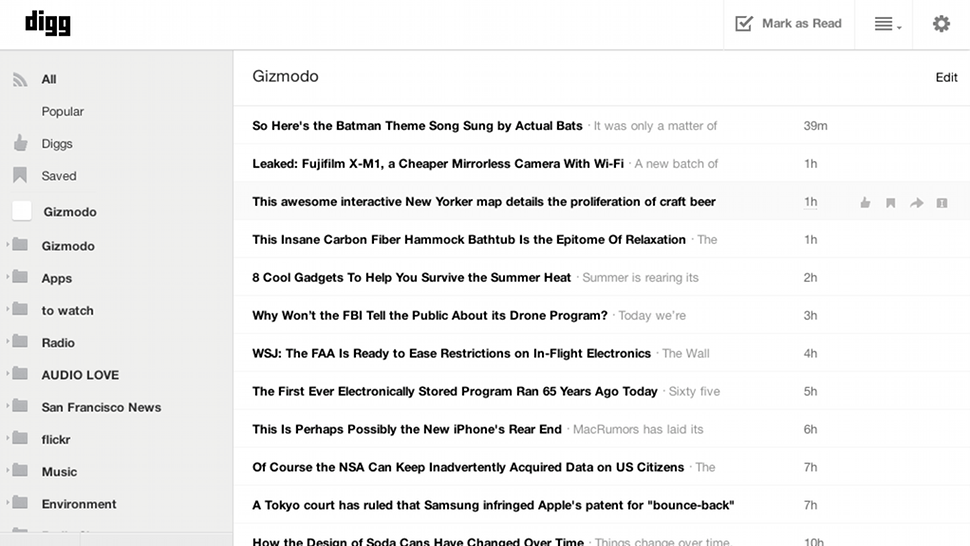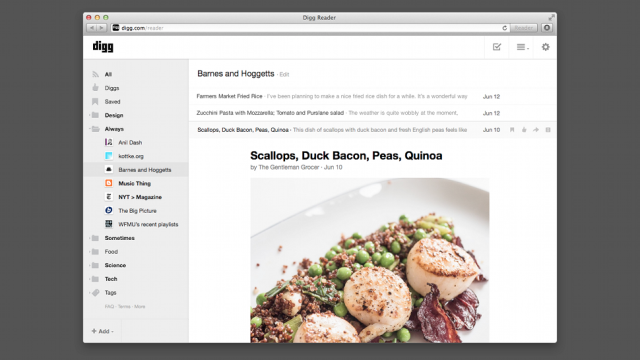Here’s the good news: Digg Reader is a real thing in the world that exists. At the very latest, you’ll have access to it next Wednesday, June 26. I just landed at an early invite page for the service, and it imported my 500 or so feeds from Google Reader in seconds. Hey, it works.
After churning its way through my account, I saw it, the product everyone has been waiting for since Digg announced its ambitious plan to replace Google Reader two months ago: An RSS reader in black and white and grey. If you’ve been reading Digg since the Betaworks-bailout, you’ll recognise the clean, minimal design. It’ll pop a little more when the full version is live next week and all of your favicons are showing up. Digg insisted I tell you that I’m using a “beta-beta”. The interim version I’m using looks like this, but it has most of what you’re going to see next week.

It’s the same reader you had before
Poof! It’s all of the feeds you had before, organised into the same categories as before. Items that you starred for later, are still in there, but your tags won’t carry over. Individual RSS entries have the social sharing options you would expect so you can easily throw a story to Facebook if that’s your style.
With a few added extras
Digg has made an effort to incorporate the reader’s sister products into the mix. You’ll note a conspicuous “I” is for Instapaper icon next to the standard share button on each item so that you can save articles to the popular read-it-later service that Betaworks purchased a little more than a month ago. And on the sidebar, you’ll see “Diggs” and “Popular” categories. The former reflects — you guessed it — stories you’ve given the thumbs up to over at the main Digg page. The latter, uses the company’s proprietary tech to crunch the last 1000 or so items from your feeds to figure out what people are talking about.
We can expect more in the future
So let’s take a step back here for a second. The reader itself isn’t a revolution as the hype might suggest. In fact, the folks at Betaworks (the company that owns Digg) would like you to take a deep breath before you get too disappointed by the service’s features. Digg Reader has been developed unbelievably quickly with a deadline in mind, and it’s far from finished. Google is evicting everyone from Google Reader on July 1st, whether or not Digg is 100-percent done. If the company is going to realise its other goals for the product, it had to make sure we all had a place to go while we waited.
Indeed, if you compare the real features of the product right now, it seems like a barebones version of the other Google Reader alternatives out there. The long-term vision, we’re told, is to build more machine reading features like the “Popular” tab into the product, so that you can filter and process the news. For example, the company has been experimenting with a tool that sorts by reading level. Give it a click, and your animated gif listicles shoot to the bottom while erudite analysis on Gawker Media publications boil to the top. That’s the innovative bit that competitors like Feedly might not be able to serve up. One thing you’ll miss for sure is the wide reach of Google account integration.
And we’ll pay the price somehow
Although, it’s hard to say for sure just what the master plan is here. Filtering through the stuff you curate for yourself s a valuable service. At the same time, RSS is a bit of an outmoded technology on that front, and you have to wonder if maybe parsing Twitter followers for interesting links might not be a better method — that’s the technology that Digg is actually using after all.
And this whole Digg Reader stunt isn’t quite a stunt, it makes a lot of sense for a company like Betaworks that’s invested big in analytics. Digg, Chartbeat, and Socialflow are all people data factories. Digg Reader jigsaws nicely with that vision.
Which is not to say anything but to point out that there’s a business plan here. Google Reader isn’t a money maker and Digg reader has to be. The company has already said that it’s going to be a freemium product, so more advanced features will cost you more than your data — they’re going to cost you your dollars.
People loved Google Reader because the API was so wonderfully open that you could just plug it in wherever you wanted. Digg is already building some API integration for services like IFTTT, but the days of the great Google Reader giveaway are gone.
Bottom line
It’s hard to really make any assessment of Digg Reader except to say, “It successfully imported my feeds.” Which is what we NEED, right? Where Google set us adrift, Digg threw us a life-preserver. While it’s exciting to see what the future might hold, right now, it’s nice enough just to have our heads above water.
